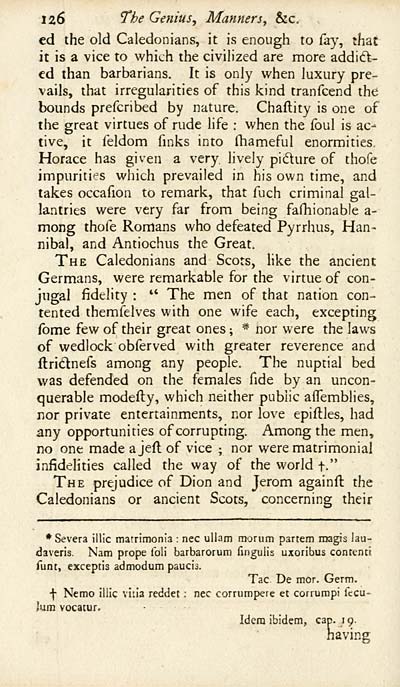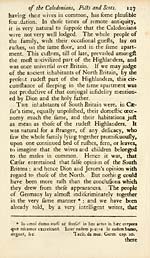Blair Collection > Critical dissertations on the origin, antiquities, language, government, manners, and religion, of the antient Caledonians, their posterity the Picts, and the British and Irish Scots
(164)
Download files
Complete book:
Individual page:
Thumbnail gallery: Grid view | List view

126 The Genius, Manners, he.
ed the old Caledonians, it is enough to fay, that
it is a vice to which the civilized are more addict-
ed than barbarians. It is only when luxury pre-
vails, that irregularities of this kind tranfcend the
bounds prefcribed by nature. Chaftity is one of
the great virtues of rude life : when the foul is ac=
tive, it feldom finks into (hameful enormities,
Horace has given a very lively pidture of thofe
impurities which prevailed in his own time, and
takes occafion to remark, that fuch criminal gal-
lantries were very far from being fafhionable a-
mong thofe Romans who defeated Pyrrhus, Han-
nibal, and Antiochus the Great.
The Caledonians and Scots, like the ancient
Germans, were remarkable for the virtue of con-
jugal fidelity : " The men of that nation con-
tented themfelves with one wife each, excepting
fbme few of their great ones ; * nor were the laws
of wedlock obferved with greater reverence and
ftriclnefs among any people. The nuptial bed
was defended on the females fide by an uncon-
querable modefiiy, which neither public aflemblies,
nor private entertainments, nor love epiftles, had
any opportunities of corrupting. Among the men,
no one made a jefl of vice ; nor were matrimonial
infidelities called the way of the world f."
The prejudice of Dion and Jerom againft the
Caledonians or ancient Scots, concerning their
*Severa illic matrimonia : nee ullam morum partem roagis lau-
daveris. Nam prope foli barbarorum fingulis uxoribus contenti
funt, exceptis admodum paucio.
Tac De mor. Germ.
\ Nemo illic vitia redder : nee corrumpere et corrumpi Iccu-
Jum vocatur.
Idem ibidem, cap. 1 9.
naving
ed the old Caledonians, it is enough to fay, that
it is a vice to which the civilized are more addict-
ed than barbarians. It is only when luxury pre-
vails, that irregularities of this kind tranfcend the
bounds prefcribed by nature. Chaftity is one of
the great virtues of rude life : when the foul is ac=
tive, it feldom finks into (hameful enormities,
Horace has given a very lively pidture of thofe
impurities which prevailed in his own time, and
takes occafion to remark, that fuch criminal gal-
lantries were very far from being fafhionable a-
mong thofe Romans who defeated Pyrrhus, Han-
nibal, and Antiochus the Great.
The Caledonians and Scots, like the ancient
Germans, were remarkable for the virtue of con-
jugal fidelity : " The men of that nation con-
tented themfelves with one wife each, excepting
fbme few of their great ones ; * nor were the laws
of wedlock obferved with greater reverence and
ftriclnefs among any people. The nuptial bed
was defended on the females fide by an uncon-
querable modefiiy, which neither public aflemblies,
nor private entertainments, nor love epiftles, had
any opportunities of corrupting. Among the men,
no one made a jefl of vice ; nor were matrimonial
infidelities called the way of the world f."
The prejudice of Dion and Jerom againft the
Caledonians or ancient Scots, concerning their
*Severa illic matrimonia : nee ullam morum partem roagis lau-
daveris. Nam prope foli barbarorum fingulis uxoribus contenti
funt, exceptis admodum paucio.
Tac De mor. Germ.
\ Nemo illic vitia redder : nee corrumpere et corrumpi Iccu-
Jum vocatur.
Idem ibidem, cap. 1 9.
naving
Set display mode to: Large image | Transcription
Images and transcriptions on this page, including medium image downloads, may be used under the Creative Commons Attribution 4.0 International Licence unless otherwise stated. ![]()
| Permanent URL | https://digital.nls.uk/76288415 |
|---|
| Description | A selection of books from a collection of more than 500 titles, mostly on religious and literary topics. Also includes some material dealing with other Celtic languages and societies. Collection created towards the end of the 19th century by Lady Evelyn Stewart Murray. |
|---|
| Description | Selected items from five 'Special and Named Printed Collections'. Includes books in Gaelic and other Celtic languages, works about the Gaels, their languages, literature, culture and history. |
|---|

